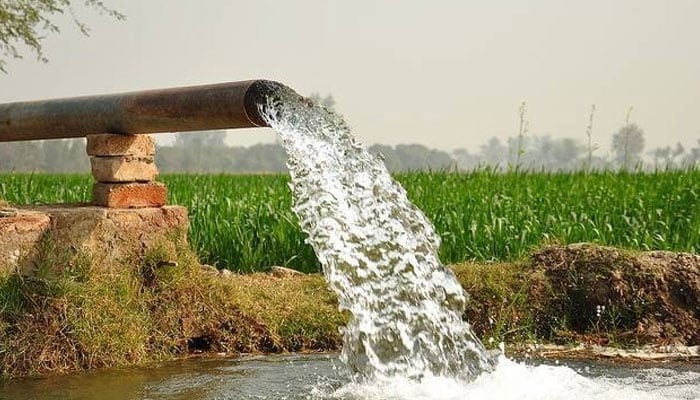Advanced tech introduced to boost water efficiency, sustainable farming
PESHAWAR: The International Water Management Institute (IWMI), a leading global research-for-development organisation, has introduced advanced scientific equipment in two districts of Khyber Pakhtunkhwa (KP) to improve crop water usage, reduce carbon emissions and promote agricultural sustainability.
The initiative centers around the deployment of the Eddy Covariance (EC) Flux Tower, a sophisticated monitoring system that would provide precise data on water and energy fluxes, offering crucial insights into the interaction between farming practices and environmental factors. Dr Umar Waqas Liaqat, IWMI’s Irrigation Researcher, said that his institute had already introduced the technology in four districts of Punjab, including Chakwal, Okhara, Rahimyar Khan, and Faisalabad.
The initiative is part of the IWMI’s Water Resource Accountability Programme (WRAP), which was launched with support from the UK’s Foreign Commonwealth and Development Office (FCDO) and CGIAR’s Nexus Gains Initiative. The programme aims to assist the KP government in addressing critical water governance and management challenges.
“Currently, the EC systems in Punjab are monitoring over 70 variables, including vital water, carbon, and energy fluxes across key agricultural zones, providing essential data for sustainable, data-driven agricultural solutions,” Dr Umar added.This technology will now be replicated in KP’s Charsadda and Mansehra districts. Charsadda relies on irrigated agriculture, while agriculture in Mansehra depends primarily on rainfall.
The EC Flux Tower, the only one of its kind in South Asia, continuously measures the exchange of gases and energy between the land surface and the atmosphere. Equipped with advanced sensors like CO2 and H2O analyzers and net radiometers, it provides real-time data on water usage (evapotranspiration), energy consumption, and carbon emissions from crops within a 200-500-meter radius. The tower also tracks crucial climatic parameters, including air temperature and humidity, playing a key role in drought monitoring, water conservation and enhancing precision farming.
“This system is pivotal for ecological and environmental research, especially in ecosystems such as forests, grasslands, wetlands, and agricultural fields,” Dr Umar explained.
-
 ‘Disgraced’ Andrew Still Has Power To Shake King Charles’ Reign: Expert
‘Disgraced’ Andrew Still Has Power To Shake King Charles’ Reign: Expert -
 Why Prince William Ground Breaking Saudi Tour Is Important
Why Prince William Ground Breaking Saudi Tour Is Important -
 AOC Blasts Jake Paul Over Bad Bunny Slight: 'He Makes You Look Small'
AOC Blasts Jake Paul Over Bad Bunny Slight: 'He Makes You Look Small' -
 At Least 53 Dead After Migrant Boat Capsizes Off Libya
At Least 53 Dead After Migrant Boat Capsizes Off Libya -
 'God Of War' Announces Casting Major Key Role In Prime Video Show
'God Of War' Announces Casting Major Key Role In Prime Video Show -
 Real Reason Prince William, Kate Broke Silence On Andrew Scandal Revealed
Real Reason Prince William, Kate Broke Silence On Andrew Scandal Revealed -
 Drew Barrymore Responds To 'Charlie's Angels' Costar's Comments About Her
Drew Barrymore Responds To 'Charlie's Angels' Costar's Comments About Her -
 Shakira Slips Hard On Stage During Life Show
Shakira Slips Hard On Stage During Life Show -
 King Charles Speaks Out Over Andrew's Scandal: 'Stand Ready To Help Police'
King Charles Speaks Out Over Andrew's Scandal: 'Stand Ready To Help Police' -
 Dax Shepard Recalls Horrifying Accident That Almost Killed Him
Dax Shepard Recalls Horrifying Accident That Almost Killed Him -
 Logan Paul's Bodyguard Hits Fan On Super Bowl Day
Logan Paul's Bodyguard Hits Fan On Super Bowl Day -
 Epstein Files: Anne Hathaway Mentioned As Highly Desired Guest For Bill Gates?
Epstein Files: Anne Hathaway Mentioned As Highly Desired Guest For Bill Gates? -
 Prince Harry Under A Lot Of Stress As Meghan Markle Makes Bizarre Demands
Prince Harry Under A Lot Of Stress As Meghan Markle Makes Bizarre Demands -
 Princess Beatrice, Eugenie's Subtle Break From Disgraced Parents Exposed
Princess Beatrice, Eugenie's Subtle Break From Disgraced Parents Exposed -
 Baby Left In Running Bathtub Dies After Father ‘forgets’ Him
Baby Left In Running Bathtub Dies After Father ‘forgets’ Him -
 King Charles Takes A Major Step To Keep Horrified Prince William Out Of The Loop On Andrew: Insider
King Charles Takes A Major Step To Keep Horrified Prince William Out Of The Loop On Andrew: Insider




